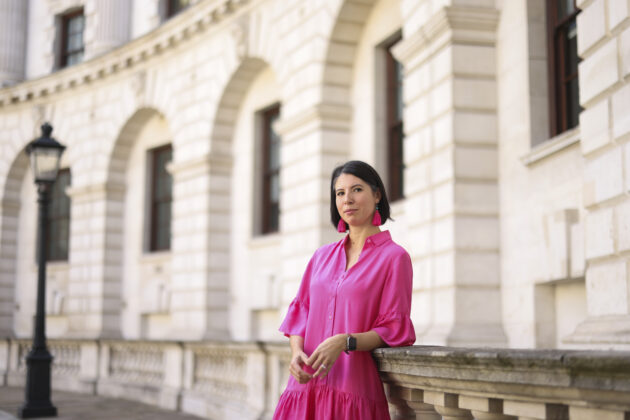GCS Deputy Heads of Discipline: 5 mins with Zara Farrar
There are 7 GCS communication disciplines: Data and Insight, Media, Strategic Communications, Internal Communications, External Affairs, Marketing and Digital. A selection of the GCS community is appointed to represent each discipline. Our Heads of Discipline (HoD) and Deputy Heads of Discipline (DHoD) are:
- Media – Andrew Darby, Department for Education (HoD) and Fiona Richards, Department for Transport (DHoD)
- External Affairs – Kate Whitty-Johnson, Department for Levelling Up, Housing and Communities (DLUHC) (HoD) and Samantha Abrams, MoJ and Davina Collison, DLUHC (DHoD)
- Marketing – Chloe Saklow, Department for Education (HoD) and Jo Parry, ONS (DHoD)
- Strategic Communications – Clara Eaglen, Department for International Trade (HoD) and Sarah Clark (DHoD)
- Internal Communications – Russell Grossman, Office of Rail and Road (HoD) and Sara Vogt, Ministry of Justice (DHoD)
- Digital – Ed Bearryman, No10 (HoD) and Zara Farrar, HM Treasury (DHoD)
- Data and Insight – Pamela Bremner, Home Office (HoD)
Zara, tell us a little bit more about yourself…

I first joined the Civil Service in 2014 working at Government Digital Service, back in the early days before every department had transitioned to GOV.UK, and then after a spell in the private sector I came back to government to work for an ALB of the Home Office. After a couple of years working with the police I thought it was time to move somewhere a little calmer. So I joined the Treasury, two weeks into the pandemic. Outside of work I’m a choral singer, performing across the UK with my chamber choir. The rest of my time is taken up with my dogs and renovating a very 1970s house (a job I started mid-pandemic).
What made you take on the DHoD role?
It’s cliched but I’m passionate about connecting people across departments to share ways of working, opportunities and skills. It’s one of the things that’s very unique to the civil service, where you get the opportunity to work across a huge range of departments and projects.
This role allows me to build on our amazing digital community across government, help provide some consistency to the ways that we work and how we evaluate that work and champion the amazing (far more than me) voices in the discipline across GCS.
Tell us something no one would know about you? What is your claim to fame?
David Hasselhoff sang happy birthday to me on my 21st birthday. He was sat at the table next to us at during a meal out to celebrate my birthday, when they brought out a cake at dessert he decided it was time to put on a show and stood up to deliver his solo rendition.
For those new to the communication profession, how would you describe the purpose, and role, of digital communicators in government?
Unlike our other communications colleagues we’re in the unique position of speaking directly to and with the public, a large part of our role is working out the best way to communicate with them, what they’re going to relate to and understand, when they want to hear from us, where they want to hear it, and increasingly, who they want to hear it from.
Every year we see more people move away from ‘traditional’ outlets, such as newspapers and broadcast TV, to get their news and head to online outlets and social media instead. Increasingly people are looking to non-traditional news sourced and ‘trusted’ third party individuals for that information.
So a huge part of our job as digital communicators is working as innovators. It’s our job to try new styles of video, or new social media platforms, or partnering with influencers, or more colloquial language as we try and find the best way to communicate government messages directly to the public.
What is the most successful digital piece of work you’ve been involved in?
It’s a very civil servant answer but I think our work throughout the pandemic must be the most successful piece of digital work I’ve been involved in. At the Treasury we very quickly shifted how we communicated, trying to find new ways to promote our covid support schemes, working, as so many across government were, under incredible pressure and in difficult circumstances. I feel like that’s one of the pieces of work I’m most proud of, rather than any one video or graphic that may have gained lots of attention at the time.
Lastly, what podcast do you recommend for our communicators to listen to?
I’ve always been a bit of a political nerd after watching a documentary about how parliament worked when I was a child. So the majority of the podcasts I listen to are related to either politics, or the media. I love Emily Maitlis, so the ‘News Agents’ has become a daily staple, ‘Page 94’ the Private Eye podcast hosted by Andrew Hunter Murray (who also hosts No Such Thing as a Fish), ‘The Tip Off’, where investigative journalists are interviewed about their stories, and ‘More or Less’ the R4 show where Tim Harford breaks down the statistics that are in the news that week – which is a very HM Treasury answer.
